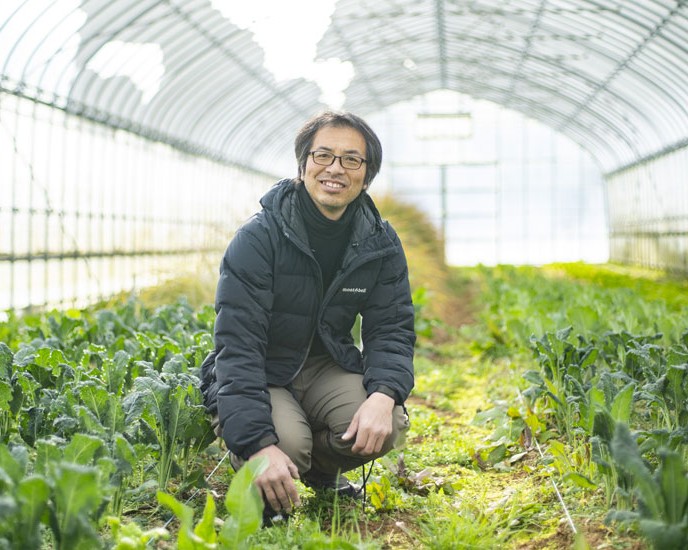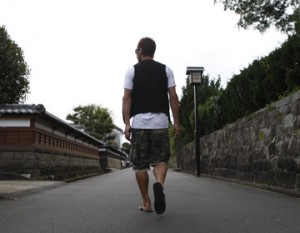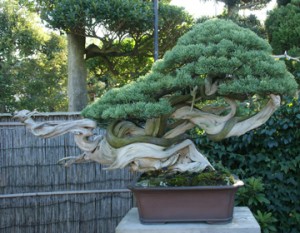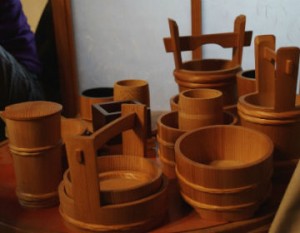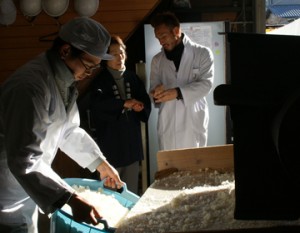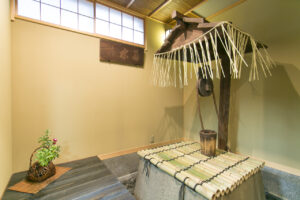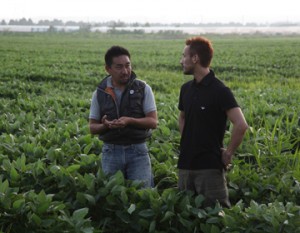Noto Taka Farm is an organic vegetable farm in Notojima, Nanao City, Ishikawa Prefecture. The couple who run the farm, Mr. and Mrs. Toshimitsu Taka and Ms. Hiroko Hiroko, specialize in growing vegetables for restaurants and hotels while focusing on soil preparation. The vegetables grown with the power of Notojima’s red soil attract chefs from starred restaurants with their rich flavor and rich aroma.
Life in Noto recognized as a World Agricultural Heritage Site

Noto is gentle, even to the soil. This phrase is often used to describe Noto’s warm-heartedness.
The Noto Peninsula is surrounded by the Sea of Japan on three sides and mountains cover most of its area. The Noto Peninsula is surrounded on three sides by the Sea of Japan, and most of its area is mountainous. The people of Noto have lived in harmony with each other, coming to terms with the abundance and harshness of nature. The “gentleness” of Noto was cultivated in this environment.
In 2011, the Food and Agriculture Organization of the United Nations recognized Noto’s satoyama and satoumi as Japan’s first “World Agricultural Heritage” site. The way of farming, which is conducted in dialogue with nature from season to season, is the very essence of Noto’s traditional way of life. Noto Taka Farm” in Nanao City, Ishikawa Prefecture, has also practiced farming in harmony with Noto’s nature.
Moving to Noto Island and Starting Farming
In the middle of the Noto Peninsula, a small island floats in Nanao Bay, a gaping hole to the east. It is Notojima, with a population of about 2,000. In the western part of the rugged island, Noto Taka Farm is located on a hill overlooking the sea.
Toshimitsu and Hiroko Taka, who run the farm, came to Notojima 25 years ago. They had been working as office workers in Fukuoka Prefecture, but decided to start farming when Toshimitsu said, “I want to do agriculture. Hiroko laughs, “We both loved to eat,” but it was a bold decision to start farming from scratch and move to a place they had no connection to.
Where to farm? There were a number of potential locations throughout Japan, but when Hiroko visited Notojima Island through an acquaintance who was an organic farmer, she knew she had found the right place. The view of the open mountains and sea, the leisurely flow of time, the beautiful changing of the seasons, and the kindness and warmth of the people. He fell in love with the island environment at first sight.
Notojima’s vegetables grow slowly in the red soil.

The soil of Notojima is red. The iron-rich red soil is fine-textured and retains water. Vegetables take time to grow their roots in the red soil and absorb nutrients slowly, resulting in a concentrated flavor.

At NOTO Taka Farm, pesticides and chemical fertilizers are rarely used. They carefully prepare the soil by analyzing the soil, adding grass and green manure to the soil, and adding minerals from the sea such as shell fossils and oyster shells.
Toshimitsu says, “It was difficult to find animal manure in the area, but I tried to make the soil from local materials as much as possible. As a result of his continued environmentally friendly farming practices, which are kind to both people and fields, he says that there are fewer pests and diseases, and pesticides are no longer necessary.
Sticking it out under the snow to preserve its sweetness

When I visited the farm in the middle of winter, the fields were covered with snow. Under the snow were turnips and daikon radishes planted in the fall. The vegetables store sugar in the soil so that they don’t freeze,” Hiroko told me. The severe cold of Notojima makes the winter vegetables much sweeter.
Cultivating a Variety of Varieties in Small Quantities” to Meet the Needs of Chefs

A peek inside the greenhouses reveals a busy botanical garden filled with fragrant herbs, lush leafy greens, and colorful edible flowers.
Currently, more than 300 varieties of vegetables are grown at Noto Taka Farm. The vegetables carefully grown in the red soil of Notojima have gained a reputation among professional chefs and are ordered by more than 100 restaurants and hotels nationwide, including starred restaurants.

Sometimes the chef himself visits the farm and makes requests for cultivation. As we responded to the chef’s needs, the number of varieties grew,” laughs Toshimitsu. The two often visit restaurants together to learn how to use and present vegetables, and apply what they learn to their own cultivation.
The small-quantity, high-variety style of growing vegetables was born from the duo’s passion to produce vegetables that are loved by customers.
They were hit twice by earthquakes and torrential rains. Delays in recovery have been a major burden.

The Noto Peninsula earthquake that struck on January 1, 2024, also shook Notojima Island. Two bridges connecting the island to the peninsula were closed to traffic, roads on the island collapsed here and there, and at Noto Taka Farm, barns and workshops were damaged, containers in greenhouses were overturned, and large cracks appeared in the fields.
Water was an especially critical issue, as the irrigation system was damaged and water could no longer reach the fields, making it impossible to water the fields or wash vegetables before shipping. Fortunately, a neighboring farmer was able to provide groundwater, so the farmers were able to fill tanks with water and transport it by truck, but the daily round-trip transportation and watering by hand has become a heavy burden.
More than a year after the earthquake, little has changed. The irrigation facilities are managed jointly by the local farmers, and they cannot even begin restoration work without the agreement of all the farmers. Many elderly farmers have no successors, so reaching a consensus is not an easy task. After repeated discussions with a view to the future of agriculture on Notojima, a roadmap for consensus has only just been found.
In addition, the shortage of labor has placed an additional burden on the Noto Taka Farm: Although there were nine staff members at the Noto Taka Farm, five of them left the farm in tears and moved off the island due to damage to their homes and delays in infrastructure restoration. The prolonged recovery caused an exodus of people, hindering the rebuilding of the business.
In September of the same year, the farm suffered another disaster. The Noto Peninsula torrential rainstorm was later designated as a catastrophic disaster. Part of the field that had been cleared after the earthquake collapsed, and turnips and radishes that had just sprouted were washed away.
Chefs from our business partners gave us the strength to look forward.
Toshimitsu and Hiroko were nearly discouraged by the earthquake, torrential rains, and other repeated hardships, but they were supported by the chefs with whom they do business. Immediately after the earthquake, one of the chefs said, “I want to help you. If you don’t have water to wash vegetables, please let us take the vegetables you have, even if they are still in the ground. Some of the chefs came to the fields to help, saying, “Don’t worry, we’re here for you.
After the torrential rain disaster, the two did their best to restore the fields for those who were waiting for their vegetables, and planted seeds as if praying for them. The vegetables they were able to harvest were smaller than usual, but the chefs at their clients were pleased with the small vegetables, saying that they were easy to use.

The two nodded at each other and said, “The relationships with so many people have been a great source of emotional support for us. They hope to express their gratitude by delivering delicious vegetables to those who gave them the strength to look forward.
The Future of Noto Taka Farm

It has been 25 years since I started farming on Notojima. They have spent a lot of time, effort, and love in cultivating the soil, and the fields have become richly fruitful. The couple’s goal now is to create an environment in which this field will continue to grow for another 50 or 100 years. Just as the people of Notojima warmly welcomed us 25 years ago, we want to preserve this red soil for future generations. He believes that by not stopping now, he will be able to repay the people who supported his farm and Notojima.
In order to pass on Notojima’s agriculture to the next generation in a sustainable manner, he has something he would like to do after the disaster recovery work is complete. That is to create a “base for people to connect. Chefs can stay and taste the vegetables, and people interested in agriculture can experience the work. By connecting people from all walks of life, the possibilities of agriculture will expand. They would like to develop an overnight farm stay facility that will serve as such a base. The future that Toshimitsu and Hiroko envision is one of warm human ties and rich red soil.
Noto is gentle, even to the soil.
The vegetables grown at Noto Taka Farm are gentle, flavorful, and powerful. The taste is the very essence of Noto’s climate.



